Samuel Chapman Armstrong of the Hampton Institute writes to Richard Henry Pratt about Pratt's attempts to establish a school at Carlisle. Armstrong notes that Commissioner of Indian Affairs Hayt seems less inclined to support their work. Armstrong also notes that he is glad to hear of Pratt's prospects with Carlisle, that he recognizes the "…
Yale University Beinecke Rare Book & Manuscript Library
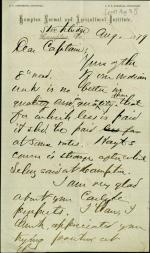
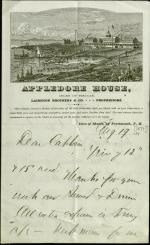
Samuel Chapman Armstrong of the Hampton Institute writes to Richard Henry Pratt discussing public sentiments towards Indian education, arguing that Pratt's upcoming school at Carlisle will help shift public views.
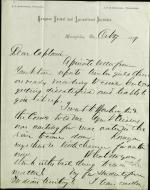
Samuel Chapman Armstrong of the Hampton Institute writes to Richard Henry Pratt forwarding a letter about girls recruited for Carlisle that are waiting in Yankton until the agent there believes the river has enough water to transport them. Armstrong reports concerns that the recruits will abandon the trip.
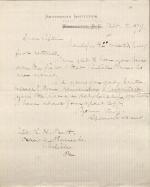
Spencer Fullerton Baird of the Smithsonian Institute writes to Richard Henry Pratt thanking him for his previous correspondence, and congratulating him on his securing of Carlisle Barracks for the purpose of establishing a school.
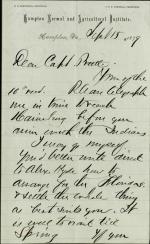
Samuel Chapman Armstrong of the Hampton Institute writes to Richard Henry Pratt discussing arrangements for Indians coming to either Hampton or Carlisle, as well as arrangements to transfer the Florida prisoners north. He also notes that Pratt can turn to the American Missionary Association for funding.
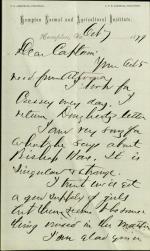
Samuel Chapman Armstrong of the Hampton Institute writes to Richard Henry Pratt, discussing some correspondence from mutual acquaintances. Armstrong also discusses Pratt's recent recruitment efforts, including gender and health concerns.
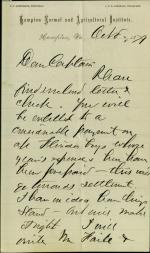
Samuel Chapman Armstrong of the Hampton Institute writes to Richard Henry Pratt about payment for expenses for prisoners from Ft. Marion.
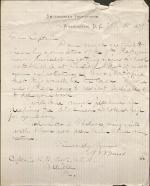
Spencer Fullerton Baird of the Smithsonian Institution writes to Richard Henry Pratt discussing how Pratt found the Carlisle Barracks site when establishing the school. Baird also encourages Pratt's son to use a scholarship to Dickinson College.
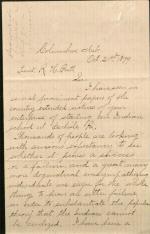
Marianna Burgess writes to Richard Henry Pratt inquiring about a position as teacher at the newly formed Carlisle Indian School. Burgess provides details on her background, and offers to help recruit Pawnee children to attend Carlisle.
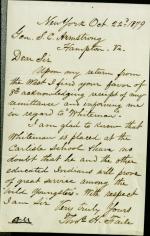
Samuel Chapman Armstrong of the Hampton Institute writes to Richard Henry Pratt discussing a recent conversation with Commissioner of Indian Affairs Ezra Hayt, and forwards a letter (on the reverse side of the page) to Armstrong from Thomas H. Fraile about Whiteman's placement at Carlisle.
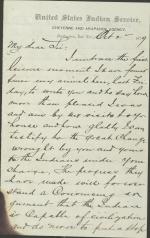
Charles E. Campbell, the acting agent for the Cheyenne and Arapaho Agency, writes to Richard Henry Pratt praising him for his work educating the Fort Marion prisoners of war, and giving him an update on recruitment efforts for Carlisle.
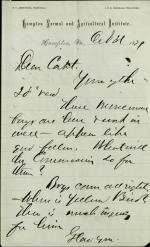
Samuel Chapman Armstrong of the Hampton Institute writes to Richard Henry Pratt discussing recently arrived Menominee boys, and inquires about Yellow Bird.
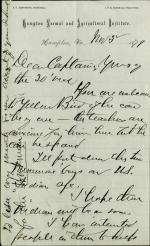
Samuel Chapman Armstrong of the Hampton Institute writes to Richard Henry Pratt about transferring some students, including Menominee boys and Yellow Bird, to Carlisle. Armstrong also discusses a visit to Carlisle on a trip north.
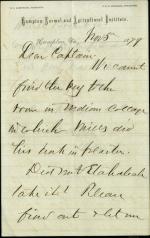
Samuel Chapman Armstrong of the Hampton Institute writes to Richard Henry Pratt inquiring whether Etadleuh still has the key to the Medium Cottage where Clark Mills took plaster casts of the heads of prisoners from Ft. Marion. Armstrong also discusses Hampton's capacity for Indian students.
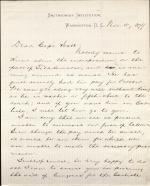
Spencer Fullerton Baird of the Smithsonian Institution writes to Richard Henry Pratt offering to transfer Tichkematse to Carlisle, and extends his support for Pratt's efforts at Carlisle in Congress.
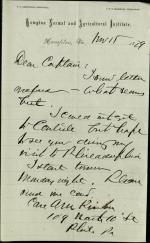
Samuel Chapman Armstrong of the Hampton Institute writes to Richard Henry Pratt to make arrangements for Armstrong to visit Carlisle while in Philadelphia.
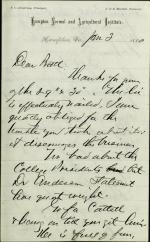
Samuel Chapman Armstrong of the Hampton Institute writes to Richard Henry Pratt about their efforts to build public support for their work via college presidents, notable figures, and newspaper articles.
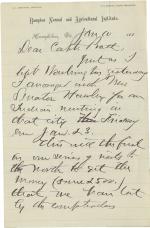
Samuel Chapman Armstrong of the Hampton Institute writes to Richard Henry Pratt informing him of a potential meeting between Armstrong and Senator Hawley to discuss money owed to Hampton by the government.
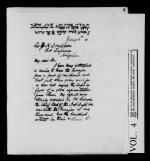
Letter from Pratt to Rev. A. H. Donaldson at Fort Defiance, Arizona, stating that he welcomes Navajo students at the school. He describes the religious affiliations of the staff and the role of religion at the school.
This material is from the Richard Henry Pratt papers, donated by his family to Yale University in 1959 and 1976.…
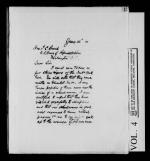
Pratt writes to Rep. Thaddeus C. Pound, sending him stereoviews of the students and providing information about their progress at the school. He notes that now that the work of the schoolroom is successfully underway they will begin fitting up the industrial shops. He observes that by selling the products of the school's industrial program to…
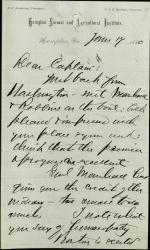
Samuel Chapman Armstrong of the Hampton Institute writes to Richard Henry Pratt discussing various individuals' views towards Indian education, as well as per capita rates.
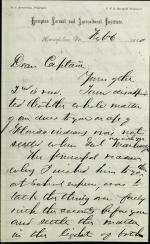
Samuel Chapman Armstrong of the Hampton Institute writes to Richard Henry Pratt about ongoing disagreements with Washington officials over expenses to be paid for the prisoners from Ft. Marion.
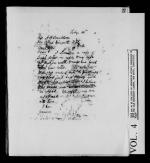
Pratt writes to the Rev. A. H. Donaldson in New Mexico, forwarding a copy of a Department of Interior letter authorizing Navajo children to be admitted to the Carlisle Indian School.
This material is from the Richard Henry Pratt papers, donated by his family to Yale University in 1959 and 1976. Selected content from the Pratt collection…
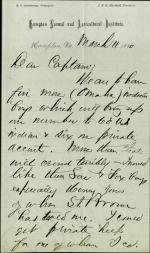
Samuel Chapman Armstrong of the Hampton Institute writes to Richard Henry Pratt discussing capacity issues at that school, including the arrival of five Omaha boys which increased enrollment at Hampton to its maximum. Armstrong also mentions Sac & Fox students and the enrollment of Indian students via both government and private support.
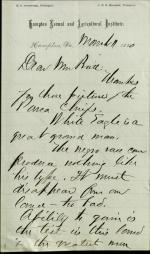
Samuel Chapman Armstrong of the Hampton Institute writes to Richard Henry Pratt thanking him for photographs of visiting Ponca chiefs at Carlisle, discussing aspects of their visit and Armstrong's fundraising attempts for a new building.
